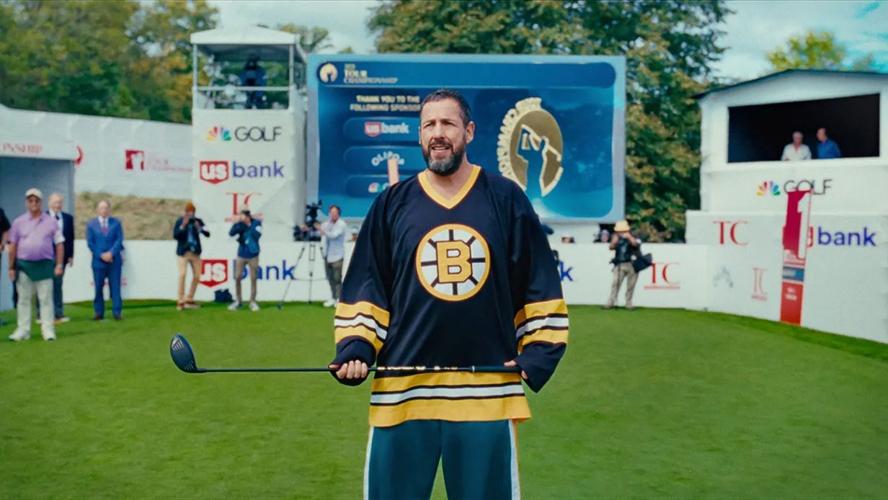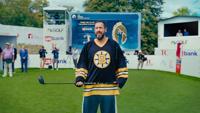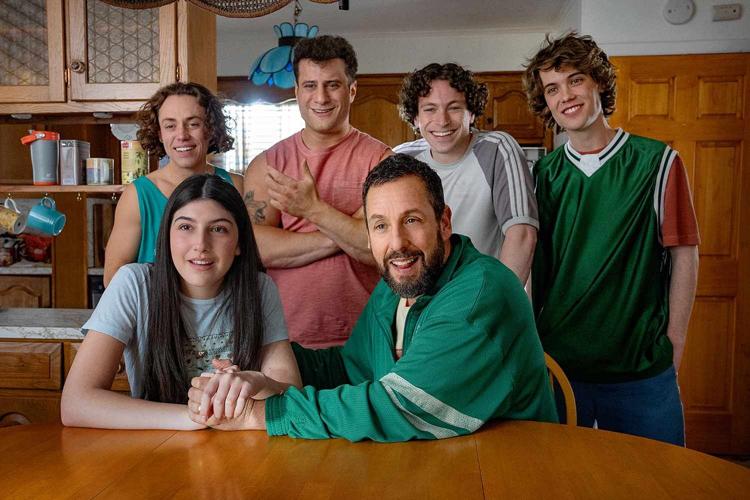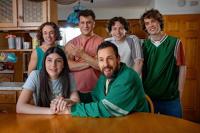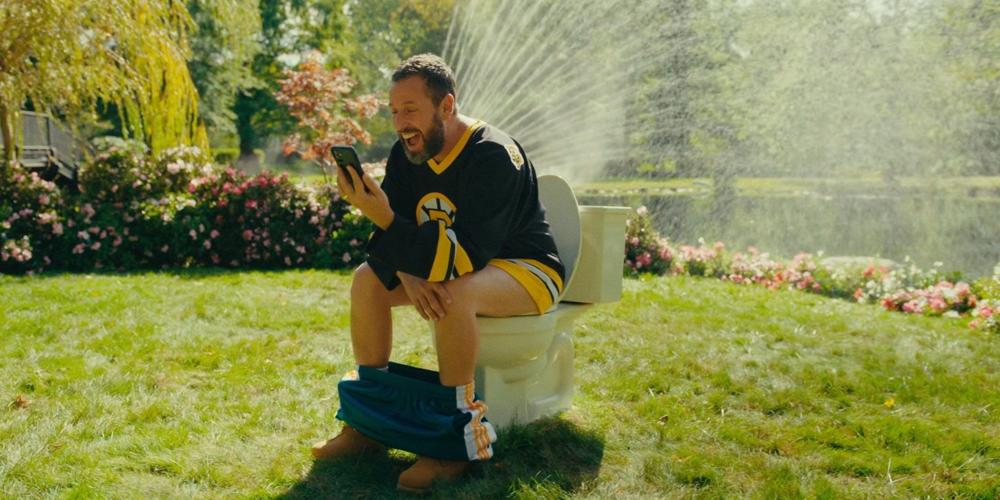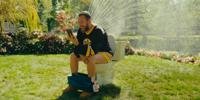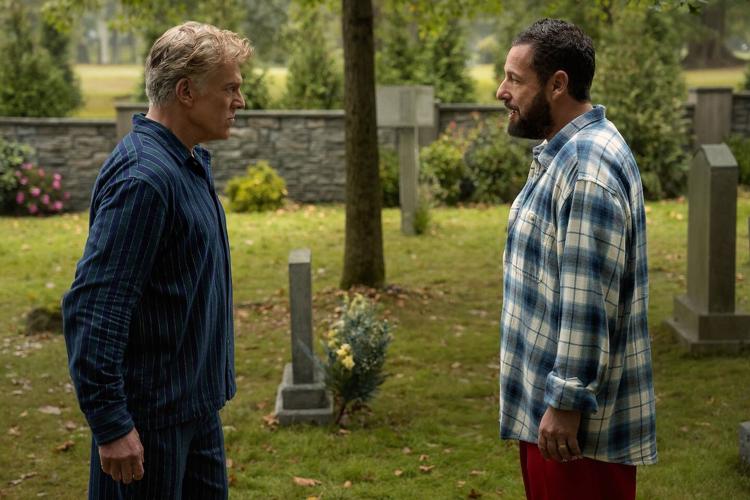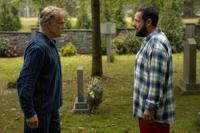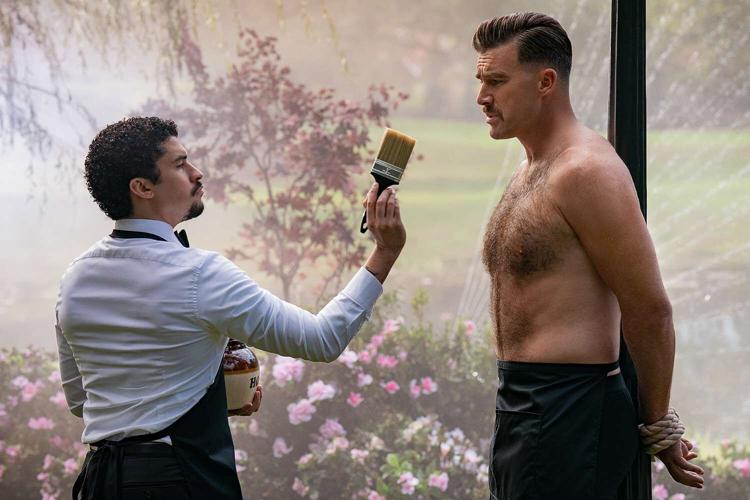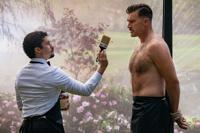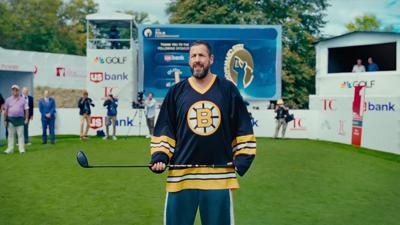Next year will be the 30th anniversary of Happy Gilmore (1996). It starred Adam Sandler who was one of the breakout stars of Saturday Night Live. That 1996 film was Sandler's third feature as lead. It was his second feature from a major movie studio. It was his first feature to make over $40 million in the box office. It began about a decade or so of Sandler starring in projects that would gross over $100 million. At this point, Sandler is in the top three of most successful comedic actors in terms of box office returns. Ironically, I've more enjoyed Sandler in his more dramatic roles in such films as Punch-Drunk Love (2002), Uncut Gems (2019) and Hustle (2022). Sandler can of course be funny, extremely funny, but his sentimental moments have been more meaningful to me. His musical bits on Saturday Night Live, particularly his song for SNL 50, are his best examples of that sentimentality.
It's ironic that this film is released only a week after I Know What You Did Last Summer (2025), which is essentially a sequel to the 1997 film of the same name. Hollywood has tapped into material from the 1980's and have rebooted or revisited all kinds of titles from that decade. Now, Hollywood is tapping into the 90's and bringing back properties from that era. It only makes sense that Sandler would too reach back to his heyday of the 90's. With some of these reboots or legacy sequels, it can be a fresh take on the material from the past with the best version of this being Ryan Coogler's Creed (2015), or, the reboot can simply be a walk down memory lane. For Sandler, he opted for the walk down memory lane where a lot of this film is simply remembering the things that people liked or stood out from the 1996 comedy and doing them all over again without any fresh takes or new interpretations. This film is just literally doing the same gags or bits repeated with nothing new or different to say, which would have been fine, but this film is also littered with flashbacks to reinforce those memories and those previous gags, so they're not even trying to hide the fact that this film is a copy-and-paste job.

Sandler returns as Happy Gilmore, a former hockey player who decides to become a golf athlete when it's discovered that his golf swing is the strongest of any player ever. His drive is literally longer than any human being. When he hits the golf ball, it goes farther across the fairway than any other player. In the 1996 film, it was exaggerated as if Happy had some kind of super strength or super power where it was him practically launching the golf ball into outer space. He would hit a ball and it would be like a rocket blasting off. Obviously, it helped him to win in the 1996 feature. In the time between then and now, Happy has become one of the best golfers in the sport, on the level of Arnold Palmer, Jack Nicklaus and Tiger Woods. However, not unlike Woods, Happy had his own scandals and controversies, which led to him getting out of the sport.
The film picks up with Happy being a single dad of five children. Four are adult boys who have their own jobs, but he's still raising his teenage daughter by himself. His daughter wants to go to a fancy ballet school in Paris, which would cost him over a quarter-million dollars. However, because of his scandals and other troubles, he's lost all his money and is living in poverty. He's still able to support his daughter by working at a grocery store, but he wants to find a way to afford his daughter's schooling abroad.

Benny Safdie is an actor who has been in films such as Oppenheimer (2023) and Are You There God? It's Me, Margaret (2023). However, Safdie is also a filmmaker who directed Sandler in Uncut Gems. Here, Safdie returns the favor by playing Frank Manatee, a younger guy who wants to recruit Happy Gilmore to a new golfing league called "Maxi Golf," which is designed to make golf more exciting. Maxi Golf adds a lot more theatrics to the sport by pitting teams of five against each other and by making the courses more than just flat grassy ground. It's instead more akin to an obstacle course or something more extreme than what you might see in miniature golf. In a lot of ways, Frank Manatee is reminiscent of the villain from The Incredibles (2004), aka Syndrome.
Syndrome was a fan and looked up to Mr. Incredible. However, when Mr. Incredible rejected Syndrome, Syndrome decided to find a way to copy what Mr. Incredible could do and then use that to best Mr. Incredible and defeat him at his own game. This is exactly what Frank Manatee does to Happy Gilmore. Frank was a fan and looked up to Happy, but when Happy rejects Frank, Frank decides to find a way to copy Happy's golfing super-power in order to best Happy and defeat him at his own game. Frank created Maxi Golf and he also created players who had the same super-power as Happy. Frank's team of golfers can also launch the ball like a rocket. He then manufactures this new golf league and will use his younger players to defeat Happy and his team of older players.

In that sense, this film is no different from another recent sports film, Joseph Kosinski's F1 the Movie (2025). That film was about two athletes who become rivals. One is older and the other is younger. It becomes a generational divide over whether a sport should be played in a traditional way or if it should be played in a way that breaks the rules and adjusts to modern or newer sensibilities. Kosinski's film mixed things up by having the older guy not be traditional, whereas the younger guy was the more traditional one. Here, it's more what you would expect where Happy is the older guy and pushes for golf to be played in a more traditional manner and Frank as the younger guy pushes for golf to be played in newer and more different ways. F1 the Movie makes more of a statement about how its sport could be jazzed up and improved or what should be the focus, especially when it comes to marketing and social media. I'm not sure this film, directed by Kyle Newacheck (What We Do in the Shadows and Workaholics), has anything to say when it comes to the sport of golf.
The film seems to have a reverence for the game, as a lot of actual, professional golfers appear in this film, including Scottie Scheffler who is mainly here as the butt of jokes, including a joke made about a real-life arrest that he had in 2024. Unlike with F1 the Movie, which also seemed to have a reverence for Formula One racing, this film didn't teach me anything about golf. F1 the Movie immersed us in the sport and in some ways deconstructed the rules in a way to educate on how they work and how they can be manipulated. Newacheck's film isn't as immersive or as instructive. Arguably, the 1996 film wasn't all that instructive either, given it was about a novice, someone who really knew nothing about golf, being thrown into the sport and having to learn. This is fine because a film like Creed isn't incredibly instructive about boxing, but what Coogler's film had that this one doesn't is a more engaging and emotional, character story.

This one attempts to have something akin to that. The reason Happy is a single dad is because his wife died. As a result, Happy becomes an alcoholic and the film is about him trying to hold onto his sobriety, while dealing with the grief of losing his wife. Anyone who knows about the term "fridging" knows that the dead wife trope is hackneyed and somewhat offensive. It's forgivable here because the 1996 film was very cavalier with how it chose to kill off characters, even ones close to Happy. Yet, as a dramatic story, I was never fully sold on Happy's alcoholism or his grief. The 1996 film didn't have much of a dramatic story either, but it was more boosted by its original gags and Sandler's comedic performance. Sandler isn't really giving a comedic performance here. Any jokes are more about how old he now is and his performance is more reflective of that reality. Sandler is probably literally too tired because he doesn't have much energy here, at least not as much energy as the 1996 feature.
Christopher McDonald (Quiz Show and Thelma & Louise) reprises his role of Shooter McGavin, the rival to Happy from the previous feature. McDonald is 70, more than a decade older than Sandler, but McDonald is capable of giving a comedic performance that has some energy to it, more energy than Sandler, and is doing things that can be argued as being funnier. Sandler is mainly the straight man surrounded by a bunch of quirky characters, including the young actors playing Happy's sons. Those actors playing Happy's sons are giving the same energy as Sandler in 1996, and Sandler's character now is simply reacting to them incredulously or nonplussed, which I'm not sure is meant to underline or disabuse us of those comedic moments. I did like the reversal from the last film, which was all about Happy going to his "happy place" and trying to embrace calm, whereas here he's more trying to embrace rage, but I'm not sure from a writing standpoint, this film does much with that concept.

Marcello Hernandez (Saturday Night Live) has a brief role in this film and is the only other person giving the kind of energy that Sandler was giving in 1996 that I would've loved to see more. Hernandez plays a character named Esteban and he really only has two scenes, which is a shame because he could've been in the narrative more. Happy Gilmore needs a caddie for the Maxi Golf tournament. Happy decides to hire a busboy named Oscar, played by Latin pop star, Bad Bunny (Cassandro and Bullet Train). Bad Bunny is a bigger star than Hernandez and having Bad Bunny in this production is guaranteed to bring an audience to this film, both Latino and otherwise, but Hernandez is the more dynamic actor. Having Estebam as the caddie would have been a better sidekick for Happy and added more comedic energy than Bad Bunny provided.
Rated PG-13 for strong language, crude/sexual material and partial nudity.
Running Time: 1 hr. and 54 mins.
Available on Netflix.

